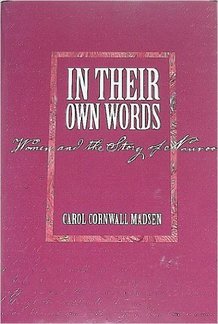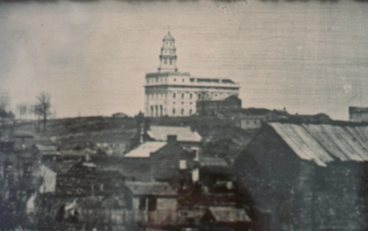
For background before writing “The Believers In The Crucible Nauvoo”, I read Carol Cornwell Madsen’s book “In their Own Words – Women and the Story of Nauvoo” These pioneers through their letters, diaries, and writings poignantly capture the mosaic that was Nauvoo, women speaking in their own voices. Three days before Vilate Kimball wrote to her husband Heber, Joseph and Hyrum Smith had died, and John Taylor and Willard Richards had been severely wounded. Heber and the remaining seven of the Quorum of Twelve were away on mission. Thus, Nauvoo was leaderless while under siege. The entire letter Vilate wrote can be found in Dr. Madsen’s book. Below is a scene using excerpts from her letter.

Through a rain-spattered window, Vilate Kimball watched Brother Adams head home. A few Saints hurried while trying to avoid puddles and streams that cut paths to lower lying areas. As she allowed the curtain to drift from her hand, she realized the dreary images were alike her thoughts and Nauvoo’s mood. She picked up a quill to do a frequent task, write to her husband away on mission.
In 1822, a sixteen year old Vilate married Heber Kimball. They, along with Brigham Young’s family, were among Joseph’s early followers. In 1832, they moved to Kirkland, then to Missouri, and to a hopeful last stop in Nauvoo. Elder Kimball became an apostle in 1835 and was often away. Vilate had endured much -- disruptive moves as the Saints fled, prolonged absences of her husband, loss of some children, and the introduction of plural marriage -- yet she remained steadfast to her husband and her Church.
She began to write:
Nauvoo 30 June 1844.
My dear dear companion,
Never before did I take up my pen to address you under so trying circumstances as we are now placed. But Brother Adams, the bearer of this, can tell you more than I can write. I shall not attempt to describe the scene that we have passed through. God forbid that I should ever witness another like unto it. I saw the lifeless corpses of our beloved brethren when they were brought to their almost distracted families. Yea, I witnessed their tears and groans, which was enough to rend the heart of an adamant. Every brother and sister that witnessed the scene felt deeply to sympathize with them. Yea, every heart is filled with sorrow, and the very streets of Nauvoo seem to mourn. Where it will end the Lord only knows.
She paused as grief overcame her. The quill shook, but knowing Brother Adams would soon return, she gripped her writing hand to ease its trembling. The quill scratched the paper breaking the silence as she wrote amid dank air:
We are kept awake night after night by the alarms of mobs. These apostates say, ‘their damnation is sealed, their die is cast, their doom is fixed’, and they are determined to do all in their power to have revenge. William Law says, ‘he wants nine more that was in his Quorum of Twelve ’. Sometimes I am afraid he will get them. I have no doubt but you are one.
The thought of William Law slaying her husband loomed as she continued writing. Overcome, she paused to wipe a tear away. More tears came, and she drew back so they wouldn’t splatter the paper. She wiped her eyes with her sleeve and continued. Her mind swirled in confusion, and she was unsure what she was wrote until she neared the end:
My time is up to send this, so you must excuse me for I have written in a great hurry and with a bad pen. The children all remember you in love. Now fare you well my love, till we meet, which may the Lord grant for his son’s sake.
Amen.
Vilate Kimball
In 1822, a sixteen year old Vilate married Heber Kimball. They, along with Brigham Young’s family, were among Joseph’s early followers. In 1832, they moved to Kirkland, then to Missouri, and to a hopeful last stop in Nauvoo. Elder Kimball became an apostle in 1835 and was often away. Vilate had endured much -- disruptive moves as the Saints fled, prolonged absences of her husband, loss of some children, and the introduction of plural marriage -- yet she remained steadfast to her husband and her Church.
She began to write:
Nauvoo 30 June 1844.
My dear dear companion,
Never before did I take up my pen to address you under so trying circumstances as we are now placed. But Brother Adams, the bearer of this, can tell you more than I can write. I shall not attempt to describe the scene that we have passed through. God forbid that I should ever witness another like unto it. I saw the lifeless corpses of our beloved brethren when they were brought to their almost distracted families. Yea, I witnessed their tears and groans, which was enough to rend the heart of an adamant. Every brother and sister that witnessed the scene felt deeply to sympathize with them. Yea, every heart is filled with sorrow, and the very streets of Nauvoo seem to mourn. Where it will end the Lord only knows.
She paused as grief overcame her. The quill shook, but knowing Brother Adams would soon return, she gripped her writing hand to ease its trembling. The quill scratched the paper breaking the silence as she wrote amid dank air:
We are kept awake night after night by the alarms of mobs. These apostates say, ‘their damnation is sealed, their die is cast, their doom is fixed’, and they are determined to do all in their power to have revenge. William Law says, ‘he wants nine more that was in his Quorum of Twelve ’. Sometimes I am afraid he will get them. I have no doubt but you are one.
The thought of William Law slaying her husband loomed as she continued writing. Overcome, she paused to wipe a tear away. More tears came, and she drew back so they wouldn’t splatter the paper. She wiped her eyes with her sleeve and continued. Her mind swirled in confusion, and she was unsure what she was wrote until she neared the end:
My time is up to send this, so you must excuse me for I have written in a great hurry and with a bad pen. The children all remember you in love. Now fare you well my love, till we meet, which may the Lord grant for his son’s sake.
Amen.
Vilate Kimball

 RSS Feed
RSS Feed
